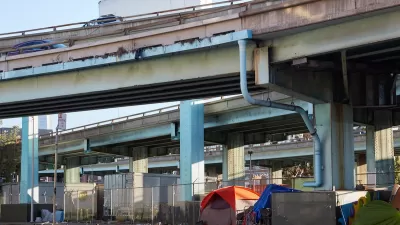A 2016 law prohibits state-funded supportive housing from mandating sobriety, but supporters of a proposed bill say a new approach is needed in light of the opioid crisis.

A proposed California bill would ‘supplement’ a Housing First approach to reducing homelessness with funding for sober living facilities. According to an article in Governing by Jenavieve Hatch, the bill would amend a 2016 law that bans mandating sobriety in state-funded housing.
As Hatch explains, “Assembly Bill 2479 would allow for up to 25 percent of the hundreds of millions of dollars the state spends on homeless housing, assistance and prevention programs to go toward sober living environments, where residents are required to abstain from substances, except for those using Medication-Assisted Therapy, such as suboxone.”
The bill explicitly states it would not evict anyone from housing for relapsing, or mandate sobriety to enter a shelter, but would support drug rehabilitation services.
Another proposed bill would make methadone treatment for opioid addiction more available. “The two bills together are both concerned with modernizing the state’s drug and housing laws to better meet the needs of the fentanyl and homelessness crises — even if that means a departure from historically progressive stances.”
FULL STORY: California Bill Would Fund Sober Housing, Suggesting New Approach

Planetizen Federal Action Tracker
A weekly monitor of how Trump’s orders and actions are impacting planners and planning in America.

Congressman Proposes Bill to Rename DC Metro “Trump Train”
The Make Autorail Great Again Act would withhold federal funding to the system until the Washington Metropolitan Area Transit Authority (WMATA), rebrands as the Washington Metropolitan Authority for Greater Access (WMAGA).

The Simple Legislative Tool Transforming Vacant Downtowns
In California, Michigan and Georgia, an easy win is bringing dollars — and delight — back to city centers.

In These Cities, Most New Housing is Under 441 Square Feet
With loosened restrictions on “micro-housing,” tiny units now make up as much as 66% of newly constructed housing.

Albuquerque’s Microtransit: A Planner’s Answer to Food Access Gaps
New microtransit vans in Albuquerque aim to close food access gaps by linking low-income areas to grocery stores, cutting travel times by 30 percent and offering planners a scalable model for equity-focused transit.

This City Will Pay You to Meet Your Neighbors
A North Kansas City grant program offers up to $400 for residents to throw neighborhood block parties.
Urban Design for Planners 1: Software Tools
This six-course series explores essential urban design concepts using open source software and equips planners with the tools they need to participate fully in the urban design process.
Planning for Universal Design
Learn the tools for implementing Universal Design in planning regulations.
Smith Gee Studio
City of Charlotte
City of Camden Redevelopment Agency
City of Astoria
Transportation Research & Education Center (TREC) at Portland State University
US High Speed Rail Association
City of Camden Redevelopment Agency
Municipality of Princeton (NJ)





























